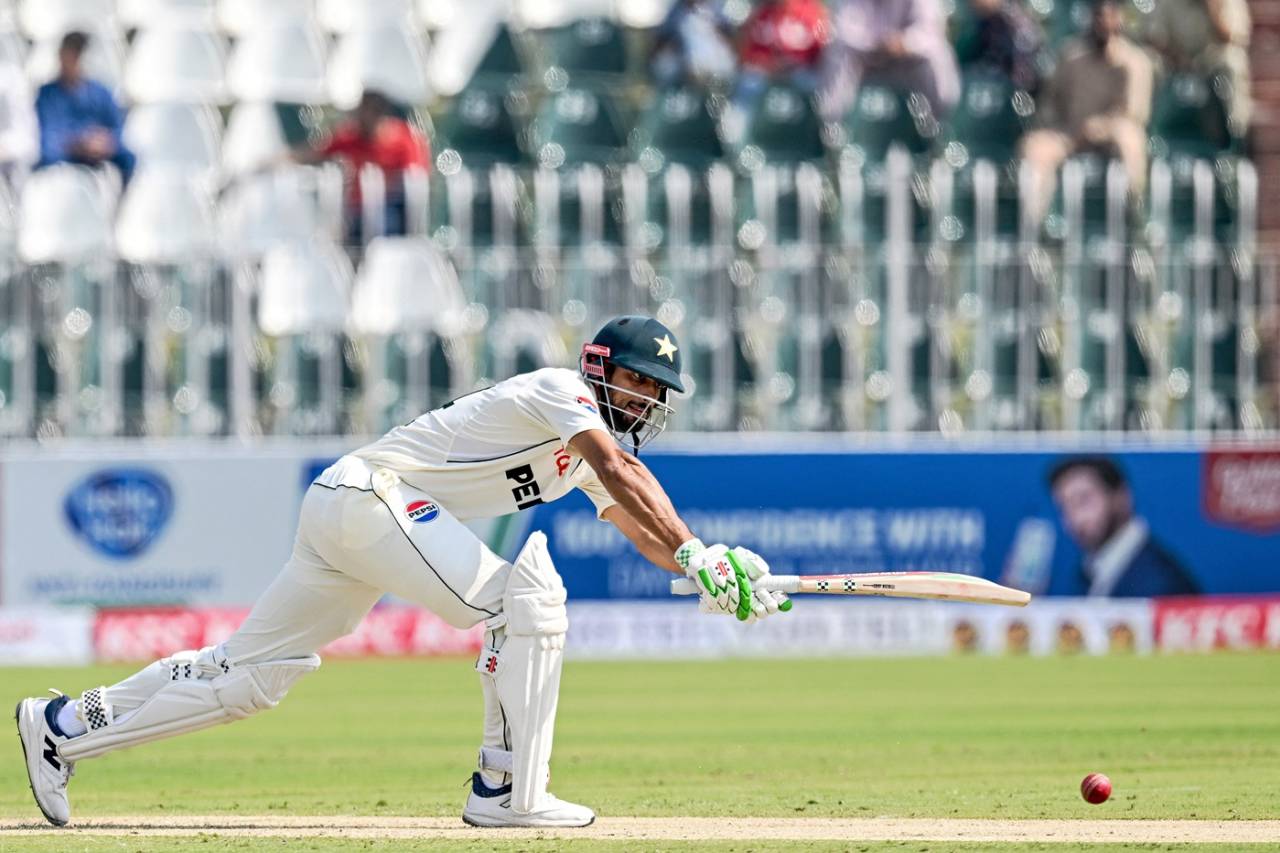First day in Pindi = first day in Lahore
Pakistan won the toss in each Test, rebuilt after one early wicket for a big second-wicket stand, and benefitted from SA's largesse in the field
Danyal Rasool
Oct 20, 2025, 4:56 PM

Shan Masood top-scored for Pakistan with a patient 87 • AFP/Getty Images
The sun was all orange and prepared to turn in for one more day. The supporters had thinned out long ago; having clustered into the Pindi cricket ground to watch Babar Azam bat, most had filtered out when his now-habitually brief stay at the crease came to a tepid conclusion. On the field, it looked as if the Test match was tying up loose ends to leave things in shape for tomorrow. But in the last half hour on day one, Pakistan and South Africa were locked in a battle to claim just enough of the spoils to each declare victory.
Kagiso Rabada, second new ball in hand, had brought it in masterfully to trap Mohammad Rizwan, whose review had the jeopardy of appeals to higher courts in an autocracy. Pakistan had demonstrated themselves vulnerable to lower-order collapses in each innings of the first Test, losing their last five wickets in 55 balls in the first innings, and their last six in 36 in the second. With 37 balls still to go following Rizwan's dismissal, both sides recognised the importance of what would follow.
Ultimately, Salman Ali Agha and Saud Shakeel held out for an uneasy stalemate, sending the sun down the sky without further damage, but it illustrated how, initially almost imperceptibly, the tenor of the day had changed. For the best part of it, Pakistan appeared to have stuck day one Gaddafi into a high-quality photocopier for the resemblance between the starts of each Test is uncanny.
They won the toss both times, rebuilt after one early wicket for a huge second-wicket stand, and benefitted from South Africa's largesse in the field, who dropped chances for fun. With the wicket invariably worsening for batting with each passing hour, Pakistan looked to be sealing South Africa's fate once more.
That remains, odds on, the likeliest outcome. Keshav Maharaj spoke of the need to break the sixth-wicket stand in the first session on Monday, which he called, moving session. But, as long as this Test appears to hold faithful to its predecessor, Pakistan did find themselves on wobbly ground at the fall of their fifth wicket in Lahore - on 199 - before a 163-run sixth wicket stand took the game away from the visitors.
But South Africa did learn the value of not going searching from that game. When they took the fifth wicket in Lahore in the 60th over, they went on to concede those 163 in 42.1 overs, just a shade under four runs per over. In that evening session, Agha and Rizwan had fed off South Africa's urgency, plundering 114 runs before stumps were called. In Pindi, the visitors would not make that mistake, using Maharaj to hold up an end even before the wickets came. The final two sessions cost just 164 at under 2.7 runs, South Africa choosing patience over keenness.
It is an approach Pakistan have adopted for their opening batter Abdullah Shafique, whose lack of form for over two years has not been punished with the same alacrity as the PCB can deploy in such matters. Shafique, in turn, chose to return the favour by trying to focus exclusively on time at the crease rather than run-scoring, his strike rate of 39.04 the lowest of any batter on Monday. He finished with a half-century but that did not necessarily mean he has a foundation to build on now. Shafique had three chances put down during a painstaking innings that should have had him back in the first half hour when he inexplicably chose to shoulder arms to Marco Jansen coming around the wicket, the ball tickling the off stump without rousing the bails.
"You have to be slightly lucky on the day in international cricket sometimes," he would later say, somewhat understatedly.

Abdullah Shafique rode his luck and also made a half-century•Associated Press
That the day ends even is, in itself, something of a victory for South Africa. Pakistan had the fortune of the toss and their opponent's generosity in the field all while batting in the best conditions. Shafique said the pitch hadn't quite slowed up and yet, his team finished the day without having utilised that template to pull clear.
It may all not matter in the bigger picture: hot takes on first day tend to be ice cold by the fourth day. Pakistan are within ten runs of the highest total of this series outside their own first innings effort in Lahore; all this may mean is they get there a little later than they might have planned or preferred.
But for all that, this purported to be carbon copy of Lahore's opening salvo could just as easily be seen as an extension to the end of the first Test: South Africa continuing to understand the conditions better, constantly making the tweaks that keep Pakistan reined in for as long as possible. The visitors have refused to give up, and in that sense, perhaps today in Pindi closely resembled not just the first day in Lahore, but every other day on this tour.
One year ago, in the second Test against England in Multan and the first Test which kicked off Pakistan's ongoing experiment with spin-friendly surfaces, they finished with the same slight uncertainty that has characterised on Monday. Pakistan's score, as the two sides walked off, was 259 for 5, precisely what it was on Monday.
Perhaps all days, as Pakistan look to whip every home surface into spin-worthy shape, are rather alike in Pakistan after all.
Danyal Rasool is ESPNcricinfo's Pakistan correspondent. @Danny61000